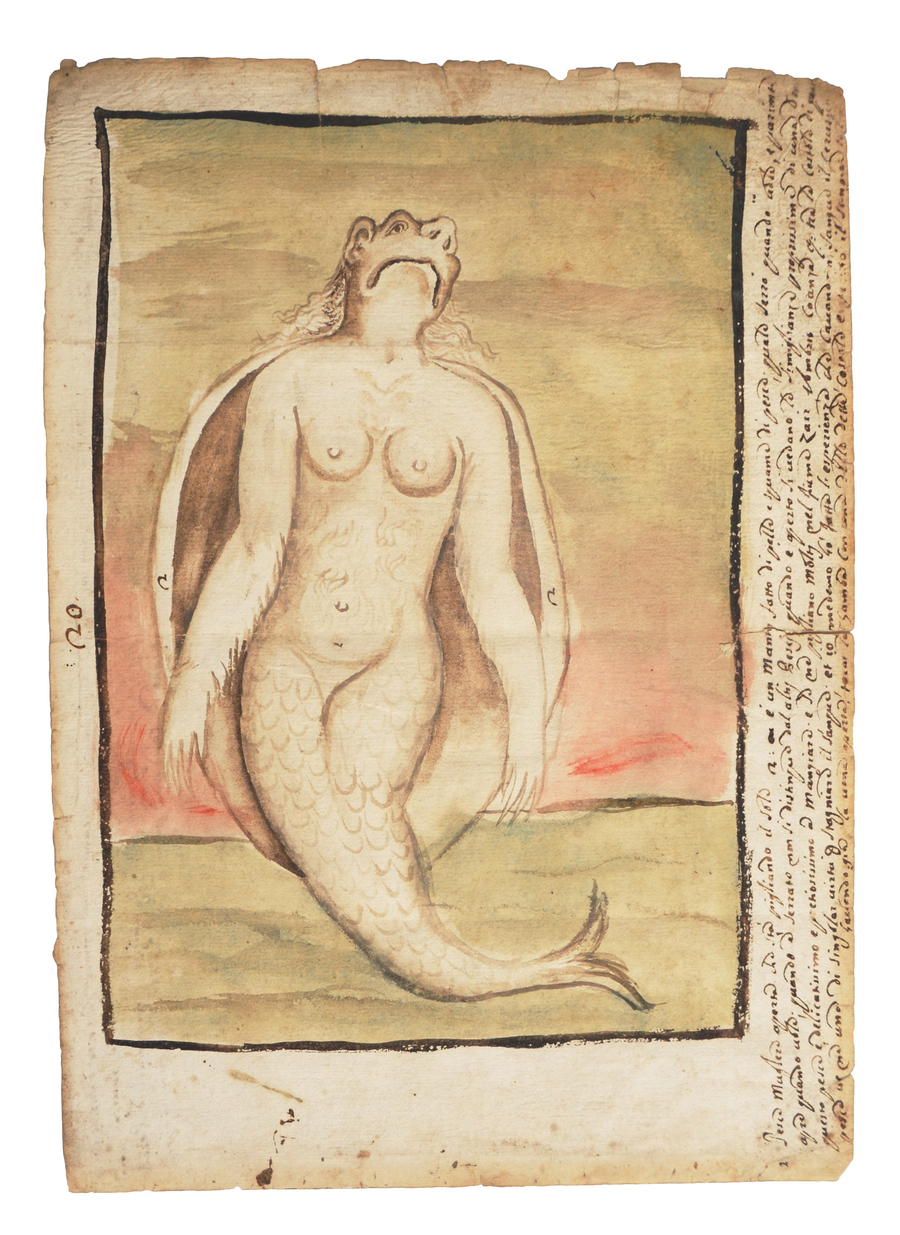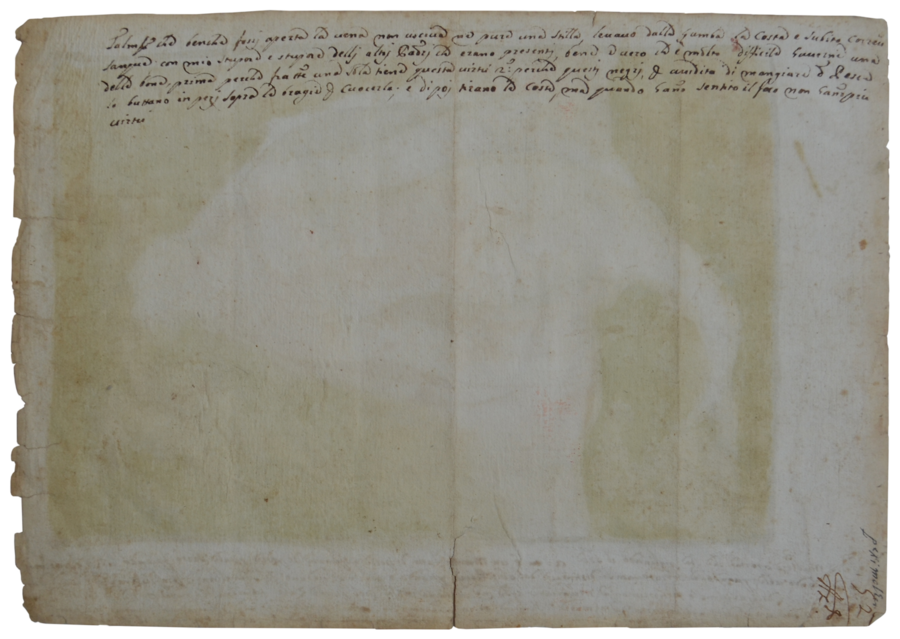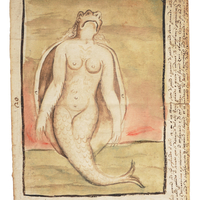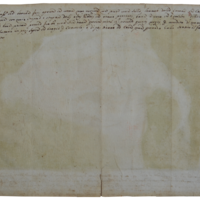PW020: Pesce Muglere . . . sunbathing
1 Pesce muglere1 aperta che stá pigliando il sole 2: é un Manto fatto di pelle e squame di pesce; quale serra quando vole e parimente apre quando vole; quando é serrato non si distingue dal altri Pesci quando é aperto si vedano la simiglianza proprissima di una Do[nna] questo pesce e delicatissimo e preziosissimo a mangiare e se ne pigliano molti nel fiume Zair Ambriz e Coanza &: tra le costole di questo pesce ve na uno di singolar virtù per stagniare il sangue; et io medemo hò fatto l’esperienza che cavandomi sangue il cerusico havendo gia la vena aperta tocai la gamba con una delle dette costole e fermó il sangue [. . .] [verso] Talmte che benche fossi aperta la vena non usciva ne pura una stilla, levavo dalla gamba la costa e subito correva sangue con mio stupore e stupore delli altri Padri che erano presenti; bene e vero che è molto difficile haverne una delle bone, prima perche fra t[u]tte una sola tiene questa virtù 2°: perché questi negri, p[er] avidita di d[etto] Pesce lo buttano in pezi sopra le bragie per cuocerlo; e di poi tirano le coste, ma quando han[n]o sentito il foco non han[n]o piu virtù2
[verso in Portuguese] pexi molher
Open Pesce Muglere that is taking the sun 2: this is a mantle made of skin and fish scales; which it closes when it wants and similarly opens when it wants; when [the mantle] is closed [the Pesce Muglere] is undistinguishable from other Fishes; when it is open one can see the very exact resemblance with a woman. This fish is very delicate and very prized to eat and many are caught in the rivers Zaire, Ambriz, Kwanza etc. Among the ribs of this fish, there is one with the singular virtue to seal the blood; and I myself have made the experiment that as the surgeon was bleeding me, having already the vein open, I touched the leg with one of said ribs and the blood stopped [. . .]
[Verso] So much so that although the vein was open not even a drop came out, I lifted the rib from the leg and immediately the blood ran to my astonishment and the astonishment of the other Fathers who were present, it is really true that it is very difficult to have one of the good ones, first because among all [the ribs] only one has this property 2nd: because these blacks because of their greed to eat said Fish, put it in pieces over the ambers to cook it, and take out the ribs later, but when they have felt the fire, they do not have virtue anymore.
[verso in Portuguese] woman fish
- 1Manatee [Trichechus senegalensis].
- 2The description of the pesce-donna and the blood stopping ability of its bones also appears in Filippo della Samtissima Trinità, Viaggi orientali del reuerendiss. p. Filippo della SS. Trinità Generale de’ Carmelitani scalzi. Da lui composti nella lingua latina e nuouamente tradotti nell’italiana da vn padre del medesimo ordine. Ne’ quali si descriuono varij successi, molti regni dell’Oriente, monti, mari, e fiumi, la successione de’ prencipi dominanti, i popoli christiani & infedeli che stanno in quelle parti. . . Con alcune cose di nuouo aggiunte per consiglio dell’autore (Rome: a spese di Filippo M. Mancini, 1666), 415-16.




Comments
This is the comment text.
Vestibulum id ligula porta felis euismod semper. Nulla vitae elit libero, a pharetra augue. Duis mollis, est non commodo luctus, nisi erat porttitor ligula, eget lacinia odio sem nec elit. Morbi leo risus, porta ac consectetur ac, vestibulum at eros.
Cras mattis consectetur purus sit amet fermentum. Maecenas faucibus mollis interdum. Duis mollis, est non commodo luctus, nisi erat porttitor ligula, eget lacinia odio sem nec elit. Aenean lacinia bibendum nulla sed consectetur. Curabitur blandit tempus porttitor.
Aenean eu leo quam. Pellentesque ornare sem lacinia quam venenatis vestibulum. Nullam id dolor id nibh ultricies vehicula ut id elit. Sed posuere consectetur est at lobortis. Cum sociis natoque penatibus et magnis dis parturient montes, nascetur ridiculus mus. Donec id elit non mi porta gravida at eget metus.
This is my comment. Anon users do not get a toolbar.
This is a reply to the above comment. Donec sed odio dui. Praesent commodo cursus magna, vel scelerisque nisl consectetur et. Sed posuere consectetur est at lobortis. Nullam id dolor id nibh ultricies vehicula ut id elit. Vestibulum id ligula porta felis euismod semper.
this is a reply to a reply.
This is a new comment. Cum sociis natoque penatibus et magnis dis parturient montes, nascetur ridiculus mus. Vivamus sagittis lacus vel augue laoreet rutrum faucibus dolor auctor. Cras justo odio, dapibus ac facilisis in, egestas eget quam. Morbi leo risus, porta ac consectetur ac, vestibulum at eros.
Add new comment